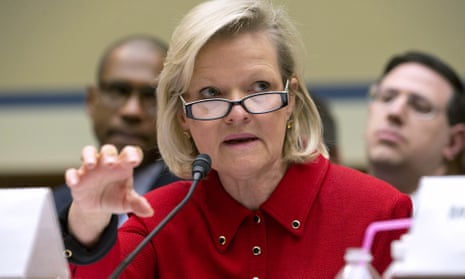Hello, and Happy Thursday,
A few Fridays ago, I was sitting in a large hotel ballroom in downtown Raleigh, North Carolina, when a lawyer named Cleta Mitchell took the stage.
Mitchell was on Donald Trump’s legal team in 2020 and played a central role in his efforts to overturn the election result. She was one of the people on the phone when Trump tried to pressure Brad Raffensperger, Georgia’s top election official, to find enough votes to overturn the election in Trump’s favor. She also recruited John Eastman, another lawyer, to work on the president’s team and asked him to prepare a memo explaining his idea that state legislatures could override the popular vote and appoint their own electors. Both Eastman and that theory were at the heart of the effort to overturn the election result and the violence at the US capitol on January 6.
In Raleigh, Mitchell eschewed the term “election denier”. “There were so many things wrong with that election,” she said. “That the outcome was correct, that’s all I deny.”
I had bought a $20 ticket to attend the summit. But shortly after Mitchell’s remarks, a security guard tapped me on the shoulder and asked me to leave the event, saying it was closed to the press. You can read the full story we published this morning on the summits here.
Mitchell wasn’t in Raleigh just to talk about the 2020 election – she was focused on the next one. Working with a group tied to Trump, Mitchell has been going around the country the last several months in battleground states to work the polls and to form task forces to monitor state and local election officials.
“We are trying to build a permanent election integrity infrastructure in every county in America that will be there to oversee what’s happening,” Mitchell said during an April appearance on Steve Bannon’s War Room podcast.
During the same podcast appearance Bannon asked her whether the summits were a chance to learn how to “take over and grab hold of and control the local apparatus in their local elections and then to network throughout the country, so we have an apparatus that’s unbreakable?” “That’s absolutely what we’re doing,” Mitchell said.
Mitchell’s effort is happening parallel to a significant effort from the Republican National Committee to recruit election workers. So far, the RNC has recruited 16 in-state election integrity directors, more than 15,000 poll workers, and 10,000 observers in swing states, according to Gates McGavick, an RNC spokesperson. Josh Findlay, the RNC’s national director of election integrity, spoke at the North Carolina summit. The RNC said it “works with other groups who have an interest in promoting election integrity” but that its poll worker focus was independent.
Audience members at the Raleigh summit received a 20-page document that lays out in detail how to form local task forces to monitor election offices. The document encourages them to become a presence in the office and research whether government officials are “friend or foe.”
Parties and campaigns have long sought to recruit people to be their eyes and ears in precincts to monitor against wrongdoing. But an effort organized by people who sought to overturn the last election and have people with deeply seeded doubts in critical election jobs is concerning, experts told me.
“Given that people who were part of the attempted coup are behind this, it’s certainly something that at a minimum we need to be vigilant about,” David Becker, the executive director of the Center for Election Innovation and Research, told me.
The 2020 election illustrated the power of having people watching ballots being cast and counted. In the aftermath of election day, workers in states like Georgia, Arizona, and Michigan came forward and signed affidavits or other statements saying they had seen irregularities at the polls. Even though those claims were all dismissed in court or debunked, they served as critical fuel for Trump and allies to spread the lie that something was amiss in the 2020 election.
“You have those people who may have worked the precinct who intentionally don’t understand the procedures and that can then, with some level of authority, spread misinformation,” Barb Byrum, the county clerk in Ingham county, Michigan, told me.
Byrum told me that at least one election official had already seen an unprecedented surge in Republicans working the polls. She said she was encouraging the clerks in her county to assign new election workers they didn’t know – Democrats or Republicans – to jobs like handing out “I voted” stickers, where they would have limited interaction with voters at critical points in the voting process.
Gary Sims, the election director in Wake county, which includes Raleigh, told me he hasn’t yet seen a huge surge in election workers signing up. He said North Carolina law was clear about what was allowed in the precinct and that disruptive people would be removed. Still, he said he had learned that speakers at the summit had shared false information about how his county handles ballots with people it was encouraging to be election workers.
“What they stated was, I want to say disinformation, not misinformation. Because it was not true,” he said. “It’s actually intentionally trying to villainize us.”
Also worth watching…
The US Supreme court will allow Louisiana to use a congressional map this year, even though a lower court found it discriminated against Black voters.
Tina Peters, a local clerk who faces criminal charges for allowing unauthorized access to voter equipment, lost her bid to be Colorado’s top election official.
The January 6 committee has broken the mold of the typical congressional hearing to create something gripping.
